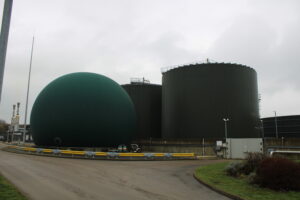OPINION: The organics recycling industry is a key component of the UK’s transition to a more sustainable and circular economy. Government policy on anaerobic digestion (AD) and composting holds the key not only to reducing environmental impact of managing biodegradable wastes but also creating jobs and revitalising soil health. A more strategic approach to these processes could unlock economic, environmental and agricultural benefits across the country. By ensuring better environmental outcomes from AD, maximising the use of organic waste for soil health and realigning incentives for waste management, the UK government can support the development of a thriving bioeconomy while protecting the environment.
AD plays a critical role in waste and resources management and renewable energy generation, converting organic waste into biogas and digestate. Digestate is a biofertiliser rich in readily available nutrients that are useful for plants and can help reduce the reliance on energy-intensive, fossil-derived fertilisers. It is important that digestate is used at the right time, in the right place and at the appropriate rates. Like any fertiliser, it can pose risks to water, air and soil quality if not managed properly. Improved digestate processing can help to mitigate some of these challenges.
Currently, the UK lacks robust policies and funding mechanisms to ensure that digestate is processed and applied in a way that maximises the benefits while minimising the potential for any harm. Further processing of digestate is an opportunity to ensure more targeted use of nutrients, easier storage and a better environmental outcome.
The government can support better digestate management by:
- Providing targeted funding to promote digestate processing innovations, such as ammonia stripping and nutrient recovery technologies.
- Encouraging the adoption of joint AD and composting plants, where fibre digestate undergoes composting, reducing ammonia emissions and improving the quality of the final product for soil application or use in growing media.
- Strengthening incentives to ensure digestate is applied according to best agronomic and environmental practices.
- Increasing research investment in digestate refinement technologies, helping to produce higher-quality soil conditioners that farmers can use more effectively.
By taking these steps, the UK can enhance the environmental sustainability of AD while improving the quality and usability of digestate for agricultural purposes.
Healthy soils are fundamental to sustainable agriculture, carbon sequestration and biodiversity. However, UK soils are facing a crisis due to erosion, declining organic matter and nutrient depletion. Natural materials such as waste-derived compost can play a crucial role in restoring soil fertility, but we are not maximising the volume of materials that could be processed and, in turn, the volume of compost that could be produced.
While energy generation from waste plays a role in decarbonisation, the balance between waste-to-energy and soil health is important. Currently, incentives such as subsidies for biomass energy and AD risk prioritising energy production over soil restoration. This can result in organic materials being processed in ways that maximise energy production rather than being used to benefit soils. Future incentives should focus on supporting energy production and using biologically treated biodegradable wastes to improve soil structure, enhance water retention, and increase carbon sequestration.

To ensure that organic waste is used where it delivers the greatest benefits, the government should:
- Review incentives that encourage the use of organic materials (especially food waste and suitable wood after treatment) for energy generation, ensuring they do not inadvertently undermine soil improvement efforts.
- Develop targeted support for composting infrastructure, enabling more food waste to be converted into high-quality compost or for composting of digestate fibre after biogas generation.
- Encourage farmers to use composted organic materials through subsidy schemes that reward soil improvement practices.
- Support research and pilot projects that assess the long-term benefits of applying composts, composted digestate and suitable treated wood-based materials to farmland.
By ensuring that organic materials are prioritised for soil health, the government can support regenerative agriculture while still promoting renewable energy solutions.
A new approach to AD and composting not only benefits the environment but also presents a significant economic opportunity. Investment in composting infrastructure, improved digestate processing, and soil restoration initiatives can create thousands of skilled jobs across the UK. These roles range from engineers and technicians developing waste treatment innovations to agricultural specialists implementing best soil management practices.
Moreover, fostering a circular economy through improved organic waste management can enhance rural economies by providing farmers with affordable, high-quality soil amendments, reducing reliance on fossil-derived fertilisers and increasing farm resilience against climate change.
The UK government has a unique opportunity to transform the way organic waste is managed. By ensuring that AD delivers better environmental outcomes and redirecting valuable organic materials toward soil health, policymakers can create a win-win scenario: healthier soils, reduced pollution, more sustainable farming and increased job creation. Through targeted funding, regulatory improvements and policy realignments, the government can position the UK at the forefront of sustainable waste management and agricultural innovation.







I could not agree more.
Why AD remains so unloved by politicians is hard to explain. Sadly, most politicians by the time they rise to a position to be able to create the sort of policy needed, have probably already encountered lobbying by their constituents who want to stop a new biogas plant on the basis of odour. So, the biogas industry is already seen as one to avoid getting involved with.
Then of course, there are associations with “muck” that nice educated people naturally recoil from, even if only subconsciously, and do best not to want to talk about.